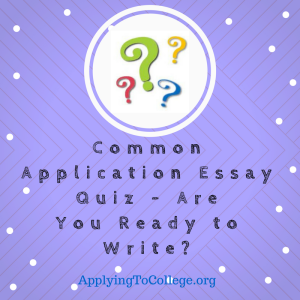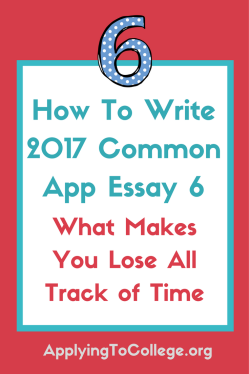 Do you know how to write your best Common Application essay?
Do you know how to write your best Common Application essay?
Do you know which Common App essay prompt is right for you? Or even how to choose?
Some schools read tens of thousands of essays a year. So it’s important for your college essay to stand out.
In this series of posts, I’ll give you tips on how your Common Application essay can stand out.
You’ll learn:
- What schools look for in Common Application essay answers
- How to choose an essay prompt
- How to avoid college essay pitfalls
I’ll give you essay examples, too.
First — let’s start with Common Application Essay basics:
- The 2017 Common Application has seven prompts (up from five last year). You answer one of them.
- The Common App essay must be between 250-650 words.
- You can’t upload more than 650 words (or fewer than 250).
- Not every school accepts the Common Application, so check every college on your list for its essay requirements.
- Click here for the entire list of 2017 Common App essay prompts.
There are two new prompts this year. The Common Application wants to make sure every student finds a question that’s inspiring.
What do schools look for in a Common Application essay?
- Your writing skills
- Your ability to communicate your ideas
- Your personality on the page. (What you care about, what makes you laugh, think, hope, dream, care, stay up at night. In other words, what’s meaningful to you and why.)
- Often, a learning or growth experience
Common Application Essay Instructions
What do you want the readers of your application to know about you apart from courses, grades, and test scores? Choose the option that best helps you answer that question and write an essay of no more than 650 words, using the prompt to inspire and structure your response.
What should you know about these instructions? They’re open-ended on purpose. You can write about anything that’s important to you, that inspires you, that you care about—in other words, what helps makes you, you. Just make sure you know what your good qualities are, and what you want the schools to know about you.
Tip: If you’re not sure what your best qualities are, download my positive qualities worksheet, which will help you figure them out. Then you’re on your way.
Okay, ready? Here we go…
Common Application Essay Prompt #1:
Some students have a background, identity, interest, or talent that is so meaningful they believe their application would be incomplete without it. If this sounds like you, then please share your story.
Is this Prompt for You? Look at the Keywords:

Background — Identity — Interest — Talent — Meaningful — Incomplete without it.
Do these Keywords Apply to You?
- “Background, identity, interest, talent.” These words are meant to spark your imagination. Think about what’s shaped your life: Is it who you are…where you’re from…what you love…how you think…a hobby you just learned? You can write about almost anything as long as it’s important to the person you’ve grown to be.
- “Meaningful” means that this experience has shaped you in a fundamental way—It has influenced your choices, outlook, perspective and/or goals.
- Your application would be “incomplete without it.” You need to tell this story in order for people to fully understand you. You also haven’t told it anywhere else in your application.
Choose this Prompt IF:
1. This experience helped shape you in a positive way.
2. If you didn’t tell this story, the admissions committee wouldn’t fully understand you.
3. Your topic doesn’t fit any of the other prompts.

Pitfalls to Avoid:
- It has to mean something. Sure, you may like to swim or travel, but unless it’s a meaningful experience that helped define you in some way, it doesn’t qualify. You have to satisfy the keywords.
- Don’t omit what you learned. Even though the prompt doesn’t specify it, make sure to include what you’ve learned or how you’ve grown from your experience. This is essential for a complete answer.
- Don’t sound like anyone else. Choose an original topic. Definitely avoid writing about sports or mission trips—they’ve been written about so much most of them sound stale. It’s better to think about what else makes you stand out. If you’ve got the best recipe for sticky buns or like to hunt for fossils, and you can link that to who you are, that’s going to be a more original topic.
Examples of 2 Successful Essay Topics:
“Road Trip”
My student, Jeff, was the youngest of three brothers, all of whom were a lot older (one was in the Marine Corps and one was a teacher). Jeff was proud that the example his brothers set had helped him become responsible and mature, and he wanted to write about it. So he chose the summer they invited him on their cross-country trip, and the night they found themselves heading into a dangerous storm.
The two older brothers began arguing: One wanted to be safe and stop for the night and the other wanted to make it to their destination on time. Jeff recognized his brothers were at an impasse, so he checked the forecast and radar maps and figured out they could avoid the storm by taking a less direct route to their destination. When they stopped for gas, Jeff got out of the car and presented his solution. When they voiced their concerns, he calmly answered all of their questions. Eventually, his brothers agreed to continue to Denver using the longer route. When they got back in the car they asked Jeff to navigate.
By keeping a level head and finding the right way to communicate with his brothers, Jeff was able to facilitate a solution that satisfied everyone. He was proud that he helped lead them safely to their destination, and even more so that he lived up to the examples of responsibility and maturity that his brothers had taught him.
Why Does this College Essay Topic Succeed?
- All the keywords are addressed. Jeff couldn’t talk about his identity without writing about his family. The example his brothers set for him made him expect a lot of himself and become a responsible leader in many of his daily activities. It was central to who he was.
- He learned from his experience. By being mature and thoughtful he found that he could make a positive difference in a difficult situation.
“Ballet Dancer”
Marina was such an accomplished ballet dancer that she studied with the prestigious Bolshoi ballet in New York. Everyone, including her family, assumed that she’d turn professional. Instead, she decided to become a nutritionist. Marina wrote about her love of ballet and how it exposed her to a hidden world of young dancers with eating disorders. Ballet led her to a new goal: helping dancers stay healthy.
Why Does this College Essay Topic Succeed?
- All the keywords are addressed. Marina couldn’t tell her story without writing about dance. It was central to her identity and her application would be incomplete without it.
- She learned from her experience. Her perspective as a dancer showed her what she wanted to do with her future.
Example of a Poor Essay Topic:
Alex enjoyed driving his car. He liked to ride for hours listening to his favorite music and taking twists and turns he didn’t know, just see where he would end up. Sometimes he drove so far that he had to use his GPS to get home.
Why Does this College Essay Topic Fail?
- The keywords are not addressed. This is a nice story, and probably would be interesting to read. But the student doesn’t indicate anywhere how or why it’s central to who he is or what his talents are. If he didn’t write about this activity, no one would miss it.
- There’s no learning or growing experience.
Is Common App essay prompt 1 a good choice for an original, memorable topic? Absolutely.
Everyone has a background, identity, talent or interest. Brainstorm. See if you can come up with one, two, or three answers to this question. Have fun! Be silly, serious, original, provocative. Make connections and see where they take you. You might just arrive at a wonderful, meaningful, and memorable Common Application essay personal statement.
Next time: How to write Common Application essay prompt #2.
Read the entire series:
How to Write Common App Prompt #1: Background, Talent, Identity, or Interest
How to Write Common App Prompt #2: The Lessons We Take From Obstacles
How to Write Common App Prompt #3: Challenged a Belief or Idea
How to Write Common App Prompt #4: A Problem You’ve Solved or Would Like to Solve
How to Write Common App Prompt #5: An Accomplishment, Event, or Realization
Coming Soon:
How to Write Common App Prompt #6: Topic, Idea or Concept that Makes You Lose Track of Time
How to Write Common App Prompt #7: Topic of Your Choice
Related links:
Huffington Post: The Common App Prompts Are Changing
The Common Application Announces 2017-2018 Essay Prompts
For the entire list of 2017 Common App essay prompts click here.
If you’re not familiar with the Common Application, go to their website. They also have a very helpful Facebook page.

Sharon Epstein is a Writers Guild Award-winner and two-time Emmy Award nominee, teaching students around the world how to master interview skills, write resumes, and transform their goals, dreams and experiences into memorable college application essays. She works with students everywhere: in-person, by phone, FaceTime, Skype and email. Visit my website for more info. Connect on Google+, Pinterest and Twitter.
Save
Save
Save
Save
Save
Save
Save
Save
Save
Save
Save
Save
Save
Save
Save
 Interesting Stats from 2015-2016 Applications:
Interesting Stats from 2015-2016 Applications:











 CAUTION!
CAUTION!








